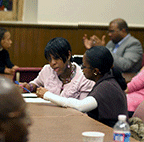|
In this issue:
1) Improved tax filing and benefit take-up – The key is to remove the barriers
2) What's New:
i) Changes for this year’s tax-filing season
ii) Why one doctor is prescribing tax returns for his low-income patients
iii) Mark your calendars for ABLE conference on Fostering Financial Empowerment
iv) Alberta Centennial Education Savings Plan (ACES) – Phase Out
3) Highlights from the Field:
i) Collaboration is key to improving financial literacy in New Brunswick
ii) Entraide budgétaire Ottawa – meeting people where they’re at
4) Resources:
5) CCFL Blog:
i) FAPS program builds financial literacy and inclusion
ii) Let tax season work for you!
6) Poll: Do you offer financial literacy services in ......
7) SEDI & CCFL News:
i) SEDI receives $10,000 donation from Toronto Community Foundation anonymous fund
ii) View the highlights video from the Case for Financial Literacy report launch
iii) 2013 SEDI Awards Call for Nominations
iv) Study of Income Inequality in Canada
8) Upcoming Events:
i) April 17, 2013 - Improving Women's Financial Literacy & Capabilities Globally (Chicago/Online)
ii) June 19-21, 2013 - IFIE-IOSCO Global Investor Education Conference (Toronto)
iii) October 7-11, 2013 - Accelearting Impact
iv) November 5-6, 2013 - ABLE conference on Fostering Financial Empowerment (Calgary)
|
|
Issue Focus: Tax Time

|
|

|
Improved tax filing and benefit take-up – The key is to remove the barriers
Every year, many Canadians, particularly those on low-incomes, miss out on a range of financial benefits and supports they are entitled to from the federal government. There are many reasons for this ‘low take-up’. Many may not know they are eligible. Or, they may face challenges applying for benefits or filing their income tax returns. Many simply do not know where to turn for help.
According to policy analyst Richard Shillington, “Citizens are missing out on many hundreds of millions of dollars in benefits, leading to a lower standard of living.” And governments miss out too, says Shillington -- on opportunities to connect with citizens, tell them about other relevant programs, and enhance the financial literacy of the population.
Filing taxes has become a critical issue. More and more government benefits, like the Canada Child Tax Benefit, GST/HST Rebates, and Old Age Security (OAS) can only be accessed by filing an annual income tax return.
Why are so many Canadians not claiming benefits?
Many low-income and vulnerable Canadians can’t get over the hurdles when it comes to filing their income tax returns. Here are some of the reasons why:
-
Newcomers may be unfamiliar with the tax system on arrival. They may also face language barriers.
-
Everyone has trouble navigating tax forms. Think of the hurdles for people with low literacy or cognitive challenges. Without help, they may fail to understand the eligibility criteria.
-
Canada Revenue has recently decided to stop mailing people their income tax forms. It has also cancelled its Telefile service. This makes things harder for seniors, people with disabilities, and people living in rural areas.
-
People on low-incomes can’t afford paid advisors, and may have trouble getting the help they need.
The very people who are most likely to qualify for benefit programs flowing out of the tax reporting system are the least likely to be able to access them.
The Task Force on Financial Literacy reported in 2011 that 160,000 eligible seniors did not apply to receive their monthly OAS benefit. This represents almost $1 billion in unclaimed benefits. It means that seniors are missing out on monthly income that could make a real difference to their financial well-being. The average monthly OAS payment in October 2012 was $514.56.
The Task Force recommended three ways that federal, provincial, and territorial governments can help correct this problem:
-
Ensure simplicity and clarity in the way programs are written and structured.
-
Simplify the application processes.
-
Intensify outreach to Canadians to improve awareness of these programs and their eligibility criteria.
Some promising initiatives that are improving take-up
Community Volunteer Income Tax Program: Across Canada during each tax season, this CRA program offers free tax filing services for people with low incomes in collaboration with community centres and libraries.
Get Your Piece of The Money Pie: Launched by the Government of New Brunswick, this initiative aims to improve residents’ awareness of the benefits and credits they may be missing out on; encourage residents to file their taxes; and increase the number of Community Volunteer Income Tax Clinics in the province. The Department of Social Development, The Economic and Social Inclusion Corporation, Canada Revenue Agency, New Brunswick Public Library System and Community Inclusion Networks are all working together to cross promote the benefits of filing taxes. As a result of this partnership, the number of Community Volunteer Income Tax clinics offered this year has increased by 80%.
The Benefits Navigator is an easy-to-use, online tool created by United Way of Calgary. It helps people identify municipal, provincial, and federal benefits and tax credits that they may be eligible for. It links users to information about each benefit, including eligibility criteria and application forms. This simple starting point could have a lot of value for both individuals and service providers.
Make Tax Time Pay in Edmonton and the Financial Advocacy Problem Solving program at St. Christopher House in Toronto are innovative and comprehensive services that are making a real difference in the lives of people living on low-incomes. These programs recognize that financial decisions – like whether or not to file an income tax return – are influenced by people’s financial literacy, as well as other psychological, social, and institutional factors. Learn more on our latest CCFL blog.
Top
|
|
What's New

|

|
Changes for this year’s tax-filing season
There have been some significant changes made by Canada Revenue Agency (CRA), which will affect Canadians as the government tries to get more people to file online.
Read more >
Top

|
|

|
Why one doctor is prescribing tax returns for his low-income patients
Dr. Gary Bloch of St. Michael’s Hospital in Toronto explains why it’s important for low income Canadians to file their taxes this tax season. The link between health and income is solid and consistent.
Read more >
Top

|

|
Mark your calendars for ABLE conference on Fostering Financial Empowerment
November 5 - 6, 2013, Calgary, Alberta
Excitement is building for the Asset Building Learning Exchange (ABLE) conference, which will take place in Calgary on November 5 and 6, 2013. Themed Fostering Financial Empowerment, the conference is an opportunity for non‐profits, researchers, and the private and government sectors to, learn together and share best practices on asset building, financial literacy, and financial empowerment for low-income people.
The conference is being hosted by the Alberta Asset Building Collaborative and organized in collaboration with the 2013 National Planning Committee. Momentum, a Calgary-based non-profit organization, has volunteered to serve as the lead coordinating agency for the conference and related finances. SEDI is also pleased to be an active member of the conference planning committee.
For more information contact:
Donna McBride at Momentum
403-204-2675 or
donnam@momentum.org
Read more >
Top

|
|

|
Alberta Centennial Education Savings Plan (ACES) – Phase Out
The Government of Alberta has announced that the Alberta Centennial Education Savings Plan (ACES) is being phased out. The decision was part of Alberta’s 2013-14 Budget.
Read More >
Top
|
|
|
Highlights from the field

|
|

|
Collaboration is key to improving financial literacy in New Brunswick
Full financial inclusion for all requires collaboration and action across all sectors. After attending the 2008 Canadian Conference on Financial Literacy in Montreal, Rick Hancox, Executive Director of the New Brunswick Securities Commission and James Hughes, then Deputy Minister of Social Development wanted to find a way to improve the financial literacy of New Brunswick residents.
What if we could harness the energy, knowledge and skills of our members’ financial literacy resources to enhance programs and services in New Brunswick, they thought. What if we could make financial literacy an essential piece of New Brunswick’s learning infrastructure?
The idea grew. They recognized that to do this, they needed to reach out to their networks. “We sent out an invitation to anybody and everybody we knew who might have an interest in financial literacy to attend a meeting to discuss how to improve financial literacy in the province,” Hancox says. The response was immediately positive and they knew they were on to something. Twenty organizations attended their first meeting, including community organizations, service agencies, educators, financial service providers, the non-profit sector and government. All were committed to collaborating on this issue.
Today members of the multisectoral Financial Education Network of New Brunswick are working together to leverage resources and programs for New Brunswickers. The network shares best practices and contacts. They also help each other provide services. “For example, if one organization is invited to present to a group that wants information on a broad range of topics, they can turn to their colleagues at another organization to see if they can present or share a resource,” says Hancox. Knowing who is out there and understanding what services they offer means members can help each other out, share tools, avoid duplicating services and provide referrals to the public.
Currently, the network is:
-
Establishing a database of financial literacy resources and contacts to support the field.
-
Defining age and life stage competencies against which to benchmark financial education activities.
-
Providing financial literacy training for staff of member organizations.
“Ultimately, we want New Brunswickers to be better prepared to deal with money matters,” says Hancox.
SEDI is a member of the Financial Education Network of New Brunswick and is currently providing it with capacity building training.
Membership is open to individuals and organizations that have an interest in the delivery of financial literacy programs. To learn more or become involved, contact Rick Hancox at Rick.Hancox@nbsc-cvmnb.ca
Top

|

|
Entraide budgétaire Ottawa – meeting people where they’re at
How can I help you today?” Is the first thing clients hear when they visit Entraide budgétaire Ottawa. Here, “Individuals come first,” says Hélène Ménard, Entraide’s Executive Director, “and this is the main reason why we exist today.” Since 1979, the Ottawa charity has been working to curb financial exploitation and indebtedness by encouraging individuals and their families to achieve financial autonomy. Their primary services are one-on-one budget counselling, income tax supports, and financial literacy sessions. All are offered in both official languages, free of charge, to those in greatest need. They have designed their services to be adaptable to the needs of each person or group they work with.
Tax season is a particularly busy time of year. On a typical day they receive 50 to 70 calls about their tax filing services. Most of the requests are for the current tax year, but the organization also supports those who need to file back taxes. “Everything flows from the income tax system. There’s a lot of money sleeping in drawers,” says Ménard. This highlights the importance of helping low-income people get access to the benefits and credits they are eligible for.
Entraide budgétaire’s income tax services include help for residents of seniors’ homes, women’s shelters, and supportive housing programs. Among the 248 such residents that Entraide budgétaire helped in 2012, the average annual income was $12,553. After housing costs were covered, these individuals had less than $11 dollars a day to meet basic needs like food, transportation, and health care.
More often than not, people contact Entraide budgétaire when they are in financial crisis. “It’s very difficult for people to talk about money,” says Ménard. “In a budget counselling session it would be very easy for me to tell a client what to do with their budget, however, I’m not the one who has to live with that budget. Our clients come back because we meet them where they are at.”
If a client hasn’t filed their income tax in a number of years, the counsellor will walk the client through the benefits and credits they are eligible for and what that means for their own revenue. “It is education and accompaniment. We’ll encourage them to contact Revenue Canada before our next session to get their tax records or, if they prefer, we’ll offer to make the call with them,” Ménard adds.
In addition to one-on-one services, Entraide budgétaire Ottawa offers tailored information sessions on a range of financial literacy topics at the invitation of community organizations. “A lot of people are worried about money,” reflects Ménard. Entraide budgétaire Ottawa is there to help.
Entraide budgétaire Ottawa is the recipient of a TD Financial Literacy Grant. The grant was provided to develop and deliver workshops in English and in French: an 'express' financial literacy curriculum and an in-depth course to train people that work with vulnerable women.
Top
|
|
|
Resources

|
|
|
|
CCFL Blog

|
|
|
|
|
Poll

|
|

|
Do you offer financial literacy services in any of the following ways?
 One-on-one counselling One-on-one counselling
 Workshops Workshops
 On-line courses On-line courses
Click here to answer
Top
|
|
|
SEDI & CCFL News

|
|
|
SEDI receives $10,000 donation from Toronto Community Foundation anonymous fund
View the highlights video from the Case for Financial Literacy report launch
|
 |
2013 SEDI Awards Call for Nominations
SEDI is actively seeking nominations from its partners and the public for its 2013 SEDI Awards. Nominations are open until May 9, 2013.
This fall, SEDI will host its 6th Awards Gala Dinner in Toronto. This signature event brings together more than 400 community, business, and government leaders to celebrate:
-
Everyday people who have overcome poverty with the help of programs offered by SEDI and its community partners across Canada
-
Remarkable staff members of community groups nationwide, whose commitment has helped others make their way out of poverty
-
An individual, group, organization, or government that has significantly expanded economic opportunities for low-income Canadians through innovation or capacity-building initiatives.
Submit a nomination and stay tuned for details on the SEDI Awards Gala Dinner coming soon. For information on sponsorship opportunities, please contact Julie McFayden at jmcfayden@sedi.org.
Top

|
|
|
Study of Income Inequality in Canada
SEDI recently submitted a brief to the House of Commons Standing Committee on Finance, which begins its study on income inequality in Canada this month. SEDI’s input emphasizes the critical importance of renewing Canada’s tax and transfer system as a means of offsetting market inequality, but focuses on complementary strategies for addressing economic inequality, specifically:
-
The importance of looking at wealth, as well as income, inequality in Canada
-
Innovative financial empowerment strategies that can help address asset and income inequality.
-
Practical recommendations for action that build on existing federal priorities and programs.
Read SEDI’s Brief
Jennifer Robson of Carleton University has also submitted a brief with more specific recommendations for changes to Canada’s tax and transfer system, while reinforcing the importance of asset based and financial empowerment approaches.
Read Jennifer Robson’s Submission the Standing Committee on Finance
Top
|
|
|
Upcoming Events

|
|

|
April 17, 2013 - Improving Women's Financial Literacy & Capabilities Globally (Chicago/Online)
Financial Literacy & Education Summit 2013
Attend live or join via webcast
Read More >

June 19-21, 2013 - IFIE-IOSCO Global Investor Education Conference (Toronto)
This conference focuses on critical issues in creating, implementing, and achieving results in financial education, financial capability, and investor literacy and education programs.
Read More and Register >

October 7-11, 2013 - Accelearting Impact
The Communities Collaborating Institute (CCI), Tamarack’s signature, week-long learning event, provides a unique opportunity to join a dynamic learning community of practitioners who desire new ways to lead, engage and transform their communities and then accelerate impact by linking local efforts to provincial, state and national agendas.
Read More and Register >

November 5-6, 2013 - ABLE conference on Fostering Financial Empowerment (Calgary)
For information contact:
Donna McBride at Momentum
Tel: 403-204-2675 / donnam@momentum.org
Read More >
Top
|
|

|
Contact Us
60 St. Clair Avenue East, Suite 700, Toronto, Ontario M4T 1N5 Tel: 416-665-2828 Toll free: 1-877-568-1571
To sign up for this e-newsletter or to unsubscribe, please send an e-mail to info@sedi.org.
|
|
|